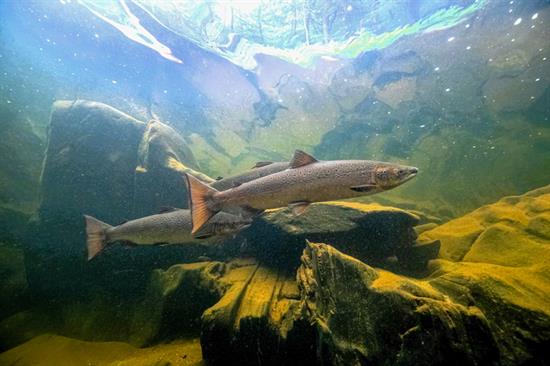Congresswoman Chellie Pingree (D-Maine) today announced that National Oceanic and Atmospheric Administration (NOAA) Fisheries has recommended $70.9 million in federal funding under the Bipartisan Infrastructure Law (BIL) and Inflation Reduction Act (IRA) to improve fish migration in Maine rivers. More than $17 million in Tribal-specific funding for the Passamaquoddy Tribe at Pleasant Point and the Penobscot Indian Nation will be used to improve habitat access for alewives, endangered Atlantic salmon, and other migratory species in the St. Croix River and the Penobscot and St. George River watersheds. In addition, a total of $53.5 million will be allocated to the Maine Department of Marine Resources, The Nature Conservancy, the City of Auburn, Maine Rivers, and the Downeast Salmon Federation to improve migratory fish passage in the St. Croix River, Piscataquis River, Little Androscoggin River, Merrymeeting Bay, and Narraguagus River, respectively.
“Migratory fish species like the alewife and endangered Atlantic salmon are critically important to preserving Maine’s biodiversity and the health of our streams and rivers. They’re also incredibly important to the Penobscot and Passamaquoddy tribes, who have harvested these species for tens of thousands of years,” said Pingree. “This significant funding, made possible through the historic Bipartisan Infrastructure Law and Inflation Reduction Act, will help strengthen Maine’s conservation efforts, restore access to healthy habitats, and support the sustainability of commercial, recreational, and tribal fisheries.”
The funding will be allocated as follows:
- $12 million for the Passamaquoddy Tribe at Pleasant Point to increase fish passage at the Woodland Dam on the Skutik River (St. Croix River). With the downstream Milltown Dam currently being removed, Woodland is one of only two remaining barriers to migratory fish in the lower river. This effort will improve access to habitat for alewife and other migratory species important to tribal cultural traditions and sustenance lifeways practices.
- $5.4 million for the Penobscot Indian Nation to address five barriers in the Penobscot and St. George River watersheds to increase access to stream and spawning habitats for migratory fish. This work will help support alewives, endangered Atlantic salmon, and other migratory species of cultural, subsistence, economic, and recreational importance to the tribe. The project will also support tribal capacity for public outreach and community engagement to identify and implement new projects.
- $7.5 million for the Maine Department of Marine Resources to continue construction of structures to improve fish passage at Woodland Dam on the St. Croix River. When complete, this effort will provide access to significant habitat for migratory fish, including 60,000 acres of habitat for alewife. By benefitting species like alewife, American shad, and American eel, the project is expected to result in increased prey for whales, dolphins, groundfish, and saltwater sportfish.
- $19.9 million for The Nature Conservancy to improve fish passage on the Piscataquis River, a major tributary to the Penobscot River. This effort will reconnect a significant amount of stream habitat in the Penobscot Salmon Habitat Recovery Unit, one of three designated regions in Maine for restoring habitat for endangered Atlantic salmon, a NOAA Species in the Spotlight.
- $3.5 million for the City of Auburn to remove the Littlefield Dam, a former hydropower project in the Little Androscoggin River, to reopen stream habitat and access to a pond for endangered Atlantic salmon (a NOAA Species in the Spotlight) and other migratory fish. They will also assess the feasibility of improving fish passage at three additional dams in the area. The project would support the local community by helping improve public safety, creating opportunities for recreation and tourism, and developing fish as an important food source.
- $13.5 million for Maine Rivers to improve fish passage at numerous sites in the Merrymeeting Bay Salmon Habitat Recovery Unit, one of three designated regions in Maine for restoring habitat for endangered Atlantic salmon, a NOAA Species in the Spotlight. Efforts will include multiple dam removals, culvert replacements, and construction of fish ladders and nature-like fishways. When completed, these efforts will improve access to significant stream habitat for Atlantic salmon and alewife. They will also support local communities by reducing flood risk and removing aging infrastructure.
- $9.1 million for the Downeast Salmon Federation to remove the Cherryfield Ice Control Dam on the Narraguagus River and replace it with a nature-like fishway, allowing for endangered Atlantic salmon (a NOAA Species in the Spotlight) and other fish to migrate unimpeded up and downstream of the site. The Narraguagus River has some of the highest quality habitat for Atlantic salmon in the Downeast Salmon Habitat Recovery Unit, one of three designated regions in Maine for restoring habitat for Atlantic salmon.
Today, NOAA Fisheries announced a total of nearly $240 million in funding and an additional $38 million in future year funding for 46 fish passage projects under the BIL and IRA through Restoring Fish Passage through Barrier Removal Grants and Restoring Tribal Priority Fish Passage through Barrier Removal Grants. This funding builds on the more than $166 million awarded for 36 projects awarded in the first round for these two funding opportunities, all of which will provide significant benefits to endangered migratory fish and sustainable fisheries.
###

